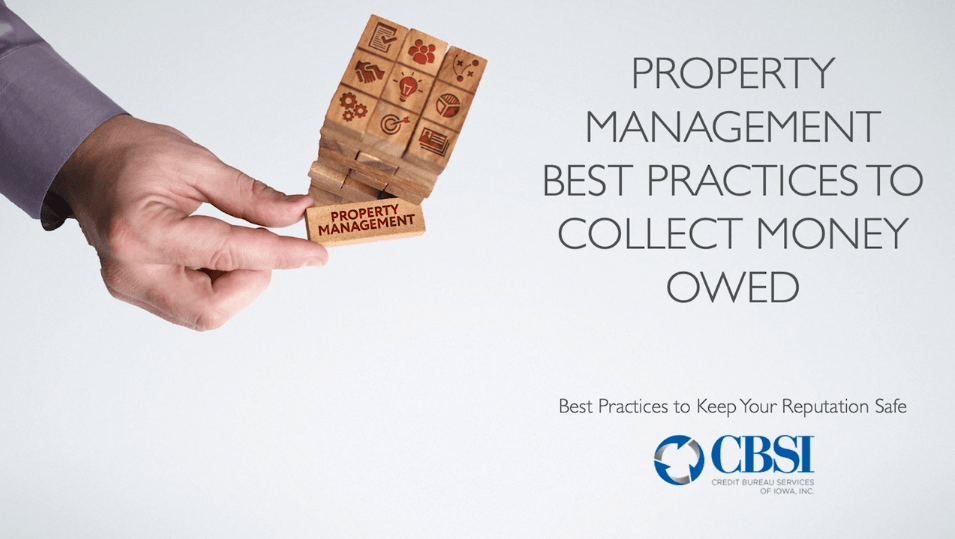Debt Collection Best Practices for Property Managers

CBSI Revenue Cycle Webinar
Imagine a collection agency recovering your accounts receivable and maintaining a happy clients, all while delivering great customer service and ensuring regulatory compliance.
In this webinar you'll learn how they do it. Plus you'll be able to do it also.
Additionally, you'll receive an update on best account receivable practices
during the coronavirus pandemic.
Thomas Barrett:
Welcome, everyone, to our webinar today. Best practices for collecting money owed for property managers. With us today is Brian Grimes, president of CBSI Credit Bureau Services of Iowa, and Megan Covert, sales assistant.
A few housekeeping notes. If you have a question, feel free to ask them during the presentation, just type them into the chat window or the Q and A at the bottom of the screen. And we will also leave time at the end of this presentation for any questions. We will also record this webinar and we'll make this recording available to all participants early next week.
Brian, Megan, thank you for joining us.
Brian Grimes:
As a collection agency that cares. We focus on connecting with consumers resulting in better returns while fostering genuine customer relationships. In today's environment, for property managers, it's really truly a nightmare. Everything is working against you.
Here are some of the most common problems facing property managers, when trying to collect money owed.
Government Regulations - you will face a wide variety of restrictions and legal challenges in collecting unpaid rent and damages. Collecting rent and evictions is more difficult today, under the pandemic restrictions to evict a tenant. They know they cannot be evicted and it makes it more difficult to collect rent.
Damages - collecting damages above any deposit amount can be difficult.
And lastly, no forwarding address. How do you find a tenant after they've moved without leaving a forwarding address? We'll talk more about skip tracing later on in the presentation.
Megan Covert:
Background checks and credit checks are critical to screening for good tenants. Add a co-signer to the lease agreement. Many times the co-signer is the parent of the tenant. So if a co-signer becomes aware of an overdue rent payment, they can bring the tenant's account current rather than take a hit on their own credit.
Tenant contact info and co-signer info, if applicable, is key to success when collecting overdue payments. Among all the normal disclosures, make sure your lease agreement gives permission to contact via autodial, automated messages, email, texts, and third-party vendors.
If your lease agreement includes interest charges for past due balances, it must be clearly stated in the lease agreement. So it must show the percentage as well. In Iowa, the maximum amount allowed is 18% interest.
Make sure you are getting as much info as possible on your leasing agreement. This is includes name, address, phone numbers, date of birth, social security numbers, middle initial. In recent years, the credit reporting agencies have really tightened their requirements on credit reporting.
So if you don't have a social security number or a date of birth, a middle initial is required to report on their credit. Employment, including the employer's phone number and address.
Phone numbers are key, including landline and mobile numbers and an email address as well. Although it's not used widespread in collections today, new legislation is in the works for providing as a safe harbor for collection agencies to email consumers.
Make sure this information is updated periodically.
Brian Grimes:
Having multiple payment plan options for your tenants can be very important. We all like to have options, and we want the payment process to be convenient. Your more traditional tenants still want the ability to pay by check and use a dropbox. But online bill pay is becoming increasingly more popular, especially with the millennials. They want to be able to access their account from their computer or phone and make their payment. CBSI receives more than 20% of our total payments online and online payments are ever increasing.
Getting credit card information and keeping it on file. Also another way to make sure payments will be made. If a tenant is behind on rent, letting your tenant set up a reasonable payment plan to catch up, can be very important. Having to bill pay a bill in full, it can be very overwhelming, so they just don't pay at all.
If they know that they can set up a plan that will work within their budget, they'll be more likely to pay. When using a payment plan, setting up an automated payment is also a good idea.
Automatic payments can be a credit card, debit card, ACH or through their checking account. Collection from a tenant when their rent is due as best. We all know that, but they will be times that we need to collect after the due date.
Current best practices in an eviction situation, when you do not have a forwarding address, we recommend turning the account over to collections agency as soon as they move out. However, if you have a forwarding address after the move out or eviction, send the first notice.
At 30 days, send a second statement. If the client does not pay, send a past due text, phone, call or email.
At the 60-day, mark send a final notice explaining that you're going to turn the account over to collections (for example X amount of days). If the client does not pay send a past due text, phone call or email.
A third-party agency would come into play at 90 days or less in a perfect world.
This chart shows the collectability of an account. The older it gets, the longer you wait sent over at account to collections, the collectability drops dramatically. Typically our returns are quite a bit even lower than this for the rental type of properties, just simply because of all the pieces in play.
Megan Covert:
So another way to look at this is as the length of time a debt is owed, your dollar shrinks. So your dollar is worth considerably less the longer the money is owed. This is why it's so important to have a consistent process in place to ask for the money. Using a professional collection agency is a key component in this process.
Our experience has been that the collection rate on overdue tenant accounts is significantly lower than this. So the sooner you start the collection process, the more likely you'll collect.
Often the tenant moves out because of a change in their employment status. So keeping in touch with the tenant until they find new employment can also increase the likelihood that you'll collect your money. So here, there are several things that you should look for when considering a collection agency, make sure you do your homework on this.
The location or market work is very important. You want to make sure the agency you use works in your market. Having a local database of consumer contact information is also extremely important for your collections. National agencies just aren't able to return as much money to you because they don't have the local contact information.
Using an agency that actively works your market gives them the ability to combine efforts because they are working with that same consumer who has debts with other local clients. It gives the agency the ability to use all the data collected and also understand the collectability of an account because they already have a relationship with that individual. The agency can also combine the accounts for that individual, which will equal a larger amount owed in total and assures the account will be worked and revisited several times to collect payment.
You will also want to ask the agency about their license. Many states do require a collection license or bond. So make sure the agency you decide to use has the correct credentials for your state or partners with an agency that does.
Does the agency pursue legal? Legal is an option that works well in some states, but not all. For CBSI it is a last resort after all regular collection efforts have been exhausted. We pursue, via right of an assignment, in CBSI''s name, so not yours. We only pursue legal on accounts that we have been unsuccessful in collecting with our regular efforts and we have verified that the individual has good full-time employment and has the ability to pay, but is just choosing not to.
Once legal has been pursued, we can garnish wages to collect the debt. The garnishment process is rather friendly as it does not drain their paycheck and only lasts 120 days, if the debt is not paid in full before then.
So be aware of that, send accounts to legal right away within 30 to 60 days of receiving the account. This is a tactic that less reputable agencies will use to charge you a higher rate. They will also sometimes send a letter to your client threatening legal, but then they never follow through with that, which is illegal.
ACA membership is also something to ask about the association of credit and collection professionals establishes ethical standards for collection agencies. Compliance and regulation are first and foremost. Members of ACA have access to the latest changes in information in the industry to stay compliant. An agency that is active in their local state, ACA Chapter is a good sign of a reputable agency. So compliance is extremely important. Your agency must be compliant with the FDCPA, Fair Debt Collection Practices Act and all state and federal regulations.
So ask if they have a compliance system in place and how they handle disputes.
Longevity of the agency is also very important. There are some fly-by-night agencies that come and go in our industry. Make sure your agency of choice has experience and there are good financial standing.
The BBB Better Business Bureau rating -- research that agency's BBB rating because, yes, individuals will complain to the BBB just to try to get out of legitimate debts. But make sure your agency is responding to those complaints and does not have an unusually low rating.
Using an agency who utilizes a secure, compliant online portal is also something to look for. It is helpful for you and your staff, as you can check on your accounts, run reports and communicate securely. It is also a great tool for your clients so they can make online payments to pay in full or negotiate a payment plan.
The collections approach -- make sure the agency you choose has a consumer friendly approach. Working with your clients in a caring, empathetic manner will get you more results than harsh demands. Being friendly, understanding and compassionate will also lead to higher returns in the long run and less complaints.
One of the most important things to remember about choosing a collection agency is to just not go for the low rate. Most agencies work on a contingency basis, but a lower contingency rate is not always best for your business. Agencies who offer unusually low rates do not put in the work needed into collecting the accounts. They may make one or two phone calls and then just give up.
So you want to focus on how much net dollars returned an agency can get you. Even with a higher contingency rate the agencies that put in the work to collect on your accounts will return more money back to you in the end, which is better for you in the long run.
To get an accurate number on how well your agency is doing, you can take the dollar amount, they have returned divided by the total dollar amount you've placed with them to get an accurate return percentage. This factors in the contingency rate, while focusing on true dollars, they were able to return to you. So lower contingency rate does not always equal savings or money back in your pocket.
Brian Grimes:
A little bit about CBSI. We are a consumer friendly debt collection agency and have been in business for over 60 years. A lot of agencies are moving more towards a consumer friendly collection approach, but luckily we've always had this mentality and sometimes it's hard to teach an old dog new tricks on the collector side.
Our collectors are flexible and take pride in helping a consumer get out of debt. We operate in a complaint-free environment, and we have a large local database. it is probably one of the key things for the rental property and via rent. CBSI has over 1300 counts and almost 2 million collection accounts in our database. So if you don't have a good address or phone number for consumer, we probably do. On average 90% of the time you send us an account, we already have that name in our database because they owe another one of our client's money as well.
The net result is more accurate data, already established relationships and a higher recovery rate. We work in multiple industries and may get a new account with more current information afterwards.
Skip Tracing - we can find tenants that have moved without leaving any forwarding address.
We do credit reports - CBSI is a credit bureau and, after a grace period of approximately 60 days, we leverage credit reporting to collect debts.
We do pursue legal with your permission via right of assignment. We can pursue legal and CBS I's name to garnish wages and collected debt. We find this as an effective way to recover on accounts they can pay, however, choose not to. We can also pursue any existing judgments that you have going back even 20 years.
Industry Experience - We currently work with several property management companies and we are complaint-free BBB. - We have an a plus rating with the Better Business Bureau and we work strictly on a contingency paces and only get paid on accounts that we collect. At this point. I just want to open it up to any type of questions that we have out there.
Thomas Barrett:
Brian, one of the questions that I have, what are the next steps, once an account is placed with CBSI for collections?
Megan Covert:
So once you place an account with us, we do send out a notice one. So that gives the 30 days to respond to us or pay in full. So after that 30 days goes by, we've heard nothing from them, we do send them to a collector and then they would make a phone call and send another letter, I believe. So that gives them 60 days then to either contact us or pay their debt in full.
So after that 60 days, then we do credit report and then we would continue phone calls and letters. You know, at that point, if they're still not responding to us, then we would ask you if, if they have enough, a small claims, we usually do a little over 500.
So if they have, you know, an existing account with other clients, we combine them together. And then we would try to pursue legal at that point. It takes maybe around six months to do that.
Thomas Barrett:
I have a question here from Caleb, "How do you work with property management companies to make sure accounts are placed timely, to avoid losing the likelihood of collection?" There's a second part to that question. So Brian or Megan, either one.
Brian Grimes:
I can handle that, Tom. Thanks, Caleb. You know, that's a great question. And typically what we ask is that folks send those over to us once the eviction process is all done with, and you have a total dollar amount owed. And you guys right now are currently faced with a situation where it's not so easy for you to evict people, and then you're continuing to not get rent.
Like I talked about before, the age of the account is very important. So I'm willing to open this up to anybody on this call to where, if you have somebody who's continuing not to pay rent, that you could place that account with us before you go through the eviction process and then what has to happen. We have to place every time that you place that account, you have a new debt owed, you have a new debt owed, you have to place a new account with us?
And then we have to go through our 30-day validation period and everything. But if you have a situation where you don't have a forwarding address, they've been evicted or they're out of apartment or rental property, there's probably no point to continue to try and send out statements, to try and make phone calls, because you may not have any of that contact information.
It makes sense to just send it over sooner than later. So maybe it's, you know, 30 days after that, after you've come up with the total amount owed or even right away.
Thomas Barrett:
Brian, I have another question from Caleb. Caleb, if you like, I can unmute you and you can talk. Caleb asks, "Do you have any special methods for collecting from international residents? They've had several instances with international residences, abandoning units and leaving the country, leaving him with little or no recourse."
Brian Grimes:
Caleb, that is a very tough one. We run into that, especially in the college areas -- Iowa City, Ames -- and I don't have really many options for you. The credit reporting is going to be tough. We'll try and credit report on those accounts, but to be able to go overseas and collect on these, we really don't have the ability to do so.
If it does get out on the credit report, hopefully if that person's back in the country, that would help pay it off down the road. But I totally understand where you're coming from. And those are some of the hardest to collect on.
Thomas Barrett:
Caleb, if you have any more questions, let us know. I have a question here, "I typically use an attorney as a first resort to collect a debt. What do you recommend?"
Brian Grimes:
Okay, well, the attorneys, we actually work accounts right now for a lot of different attorneys and we market to them. Sometimes the letter from the attorney doesn't hold as much weight as one would think. Sometimes you're just throwing good money at bad money. So the attorney is going to cost you typically, no matter what, to send out the demand letters to work that account and potentially to pursue legal.
So they also don't have as many leverages as we have. The credit reporting is a huge leverage that we have. We've got the team of collectors making phone calls. We've got the database and then we can, and will, pursue legal without any costs to you, if it looks like an account that does look collectible.
Maybe they have a bunch of other liens and judgments out there, tax liens, whatnot. It does not make sense usually, unless they have a job and then they have not a lot of different liens and judgments out there to pursue legal at that point in time.
Thomas Barrett:
Caleb, if your question hasn't been answered, let us know. I have a question here from Brenda, "How are accounts submitted to CBSI? Do you integrate with any accounting software or do we have to manually submit accounts?"
Brian Grimes:
That's a great question. So I don't actually integrate to any of the software as far as property management companies goes. And I know there are companies that do, and you're looking at an out-of-state type agency that typically doesn't have the ability to work the accounts thoroughly. They may not, more than likely aren't going to have any type of database that we do.
And you're better off, frankly, working with a more local agency when the biggest piece is the legal. A lot of these agencies are not going to pursue legal at all. You know, they may send out a threatening letter for that, but it's really hard to set up a full network of attorneys across the country to be able to pursue legal.
Now, having said that, we can work off of any type of spreadsheet that you have, whether that be like an Excel spreadsheet, comma-separated values. We can work with that. And if it's a decent size account for us, we could see about programming to make sure that we can get all that data in there regardless of the format. So we have a web portal that you go online. You can place the accounts online. You can either enter them onesy, twosy. We have a data entry team that can help edit data, enter those accounts, if you have all the information on paper.
And then lastly, like I said, the upload piece is really pretty slick. As long as you can get and run a report on your end and send that over, we can get it into our system.
Thomas Barrett:
Okay, we're coming up to the top of the hour. If anyone has any questions that they didn't feel comfortable asking, or if you have anything else you'd like to discuss with Brian or Megan, their phone number is (800) 383-0234, or you can email them at info@creditiowa.com.
Thank you very much for your participation. We will get you a recording of this webinar next week. Thank you and have a great day.
Brian Grimes:
Thank you, everybody.
Recent Posts











Share On: